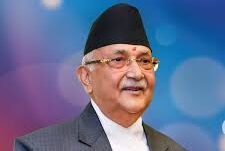 तीव्रखबर
तीव्रखबर

Kathmandu,; Prime Minister KP Sharma Oli has asserted that it is the responsibility of each State to respect the voting rights of the citizens.
Inaugurating the 12th Conference of the Forum of Election Management Bodies of South Asia (FEMBOSA) today, the Prime Minister said the elections is the means of demonstrating people’s aspirations and mandate.
“In South Asia, we share many common challenges. From ensuring voting rights and addressing diaspora issues to fostering fair competition and coexistence among political parties, our experiences often run parallel.
From movements for independence to struggles for comprehensive democracy, the leaders of South Asia have made unparalleled sacrifices for the cause; we have earned the high esteem of our people.
However, weaknesses in post-movement management and ineffective service delivery, amidst the high expectations of our citizens, have allowed autocratic and regressive forces to challenge our democracies time and again.”
Ensuring universal suffrage, and conducting free, fearless, accountable, and transparent elections where governance is determined by the people’s choice, is the only solution to such manipulation against honest and innocent citizens, he added.
According to the Prime Minister, each citizens shall have to the opportunity to exercise the right to vote no matter where they are.
Our efforts will be for enabling atmosphere towards that end, he said, adding that it is warranted to work collectively to simplify the election procedures as per the aspirations of the citizens residing at home and abroad among opportunities and challenges induced by migration, climate change and social media.
“Climate change, as we all understand, is far more than an environmental issue; it touches every facet of our societies.
From rising sea levels and melting Himalayan glaciers to unpredictable weather patterns and natural disasters, the impacts of climate change threaten our ability to ensure that every citizen can exercise their right to vote.
As leaders in election management, we must confront these challenges head-on and develop strategies that protect the integrity of our electoral processes, even in the face of such adversity,” Prime Minister Oli said.
He added that “migration, too, presents its own set of unique challenges. The movement of people across borders and within our own countries has profound implications for electoral rolls, voter identification, and the right to vote.
In a region where countries serve as both sources and destinations of migration, we share the burden of addressing issues such as managing large numbers of foreign arrivals while also accommodating our citizens abroad.
With often insufficient infrastructure, we face significant challenges in ensuring that no citizen is disenfranchised due to their circumstances. We must explore ways to include our diaspora in the democratic process, ensuring their right to have a voice in the future of their homeland.”
Social media and artificial intelligence are revolutionizing the way we engage with voters and conduct elections.
While these tools offer unparalleled opportunities for outreach and participation, they also bring risks—risks of misinformation, disinformation, fake news, and manipulation that can erode trust in our democratic institutions.
As we embrace these technologies, we must do so with caution and a steadfast commitment to upholding the highest standards of transparency and accountability, according to the government head.
The Prime Minister informed the gathering that climate change, migration, the rise of social media, and the role of artificial intelligence will be discussed by relating to the election management.
He expressed his hope that the Conference will undoubtedly contribute to advancing the FEMBOSA charter, reinforcing our collective efforts to ensure free, fair, and transparent elections across the region.
“Together, let us ensure that the outcomes of this gathering resonate far beyond these walls, fostering a future where every election truly reflects the will of the people.”
During the opening session, Forum Chairperson Dasho Sonam Topgay, the Chief Election Commissioner of Bhutan, handed the Forum leadership to Chief Election Commissioner of Nepal, Dinesh Kumar Thapaliya.
The two-day event is attended by Chief Election Commissioners and representatives from the South Asian nations including Nepal, India, Bhutan, Sri Lanka, and the Maldives. The 11th Conference of FEMBOSA was organised virtually two years ago under the chair of Bhutan.
प्रतिक्रिया